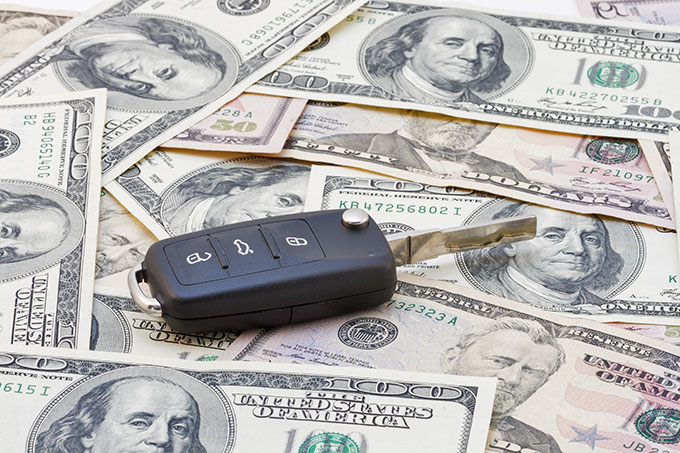
This calculator figures monthly automotive loan payments.
For your convenience, current El Monte auto loan rates and personal loan rates are published below the calculator.
Various loan products service diverse funding needs, from conventional financing, to alternative options reserved for special circumstances. Proceeds are used to make major purchases, like homes and cars, as well as covering education costs and other unique expenses. Each loan performs a vital function for borrowers, so access to assorted forms of funding is an important aspect of financial security. Following an industrywide remake, however, borrowers now face a new set of rules.
Lending markets have undergone a transformation in recent years, partially in response to a major meltdown in the mortgage industry. The bottom fell out of home lending, in part, because standards were relaxed and risky loans were made. Unfortunately today's loan-seeker pays the price for past industry indiscretions, facing deeper scrutiny and rigorous credit protocols.
Whether financing a home, automobile, or other major purchase, applicants with the best credit references earn the most attractive rates and loan terms. Advertisements referencing “well-qualified” applicants, for example, speak directly to consumers with top notch credit scores. Though others may be eligible for the loans, the low rates and promotional incentives portrayed in advertisements are exclusive to deals cut with the cream of the crop. Progressively, as qualifications diminish in strength, so do the perks and benefits tied to available loans.
Fortunately, bad credit borrowers are not without recourse. Despite paying more for lending services than those with pristine references, loans are available to meet the needs of credit-impaired buyers. Consumers needing car loans, for example, have several options for staying on the road. If your credit history has flaws, consider the following strategies as you position for an automobile purchase.

Regardless of your financing needs, competitive markets offer multiple options for funding. To make the most of your automobile budget, it is essential to land the best possible interest rate for your loan. Even before selecting a car to purchase, preliminary research sets the stage for favorable financing. In fact, a loan's annual percentage rate has as much influence on total car costs as the price you pay for the vehicle.
Web-based resources furnish comparison tools, enabling side-by-side loan evaluation. Though you can't lock-in precise loan costs without actually applying, contrasting relative options online gives you the tools needed for general comparisons. Once you've narrowed the field, it becomes easier to pursue direct contact with a few potential candidates.
Banks provide automobile financing, so they are a good place to start for car buyers. In fact, funding options found there are among the best available for well-qualified buyers. Without strong credit references, however, your conventional loan options from banks are limited. Credit unions may extend special consideration to members, but good credit is still required to secure the best car loan interest rates from your CU. Regardless of where you think you stand, in terms of creditworthiness, it pays to investigate banks and credit unions – perhaps locations where you conduct other banking businesses. The worst you'll suffer is rejection, which can be useful information, in itself.
In some cases, dealer programs present the best options for auto financing, but careful evaluation is required when comparing dealership loans to others. In-house services are conducted differently than the way banks and other finance organizations do business, so their availability doesn't eclipse your responsibility to investigate alternatives. Without a base of understanding, you are at a disadvantage negotiating the best terms with a dealer, so don't be lured by the convenience of one stop shopping.
Using dealership programs can impact rebates and other sales incentives offered by car makers. For example, some dealers extend ultra-low interest rates for car purchases – sometimes zero percent, but signing up voids other offers. The programs are typically reserved for applicants with excellent credit scores, eligible for short-term loans of three or fewer years. And because their primary business is selling cars, not finance, dealerships typically mark-up annual percentage rates, to lower their risk and increase profits. As a result, your contract could represent a higher rate than you'd qualify for elsewhere.
When comparing loan terms it is important to look beyond monthly payment amounts. Locking-in low payments on a long-term loan may lead you to significantly overpay for your car. Though car warranties and manufacturing quality are better than they once were, loans extending beyond five years should be weighed with an eye toward total cost and depreciation, rather than what's due each month. Loans without prepayment penalties, on the other hand, furnish affordable repayment terms while still accommodating early pay-off.
One unique financing option specifically targets buyers with past credit problems. Buy here pay here (BHPH) dealerships are distinguished from other car franchises offering funding services, because they specialize in creative financing for those unable to secure conventional means. For the added risk of lending to credit-challenged applicants, BHPH car dealerships charge particularly high interest rates on approved loans.
Conventional avenues furnish the most attractive features for car buyers, but BHPH dealerships serve a vital role for those denied other forms of credit. If you've been rejected by a bank or finance company, and see no other way to secure a vehicle, BHPH dealers prepared to extend terms might be your best chance of closing an automobile deal. And since financing offers from major manufacturers typically apply only to new car purchases, used car shoppers with credit trouble are particularly well served by buy here pay here dealerships. In fact, properly managing your car loan account can help repair your credit, adding further incentives for BHPH customers.
The type of vehicle you buy influences your options paying for it. The dealer-touted 0% offers extended by the finance arms of car makers generally don't apply to pre-owned vehicles, so securing such terms requires a brand new car purchase. Although the favorable conditions make buying a new car more palatable, low interest rates should not be mistaken for affordability. For starters, major depreciation occurs during the first year of ownership, so used cars make fiscal sense for buyers ill-equipped to absorb such losses.
Before settling on a vehicle, use available resources to compare and contrast models, paying close attention to price. Online auto valuation guides, from sites like Kelley Blue Book and Edmunds show price ranges for particular vehicles. The guides enable you to customize pricing parameters to reflect mileage, condition, location and the precise features found on each automobile of interest. These early research opportunities are vital for determining what you can afford.

Another reference for used car buyers comes directly from the National Automobile Dealers Association. The organization's Official Used Car Guide shows pricing trends based on actual sales. . Carfax and other resources also shed light on quality and condition, furnishing vehicle repair and sales histories for particular cars of interest.
Used car buyers in need of financing also benefit from certified pre-owned programs and dealer/manufacturer incentives on late models cars they endorse. According to most programs, cars are subject to inspections conducted by factory mechanics, covering all the major systems before approving a vehicle's “certified” status. The added measure of scrutiny protects buyers, but it also gives lenders confidence in the vehicles, which works to the advantage of poor credit loan applicants.
Like other car buyers, those with checkered credit are interested in reasonable financing alternatives. Too often, bad credit buyers fail to explore the nonprime market, where deals are still possible. Resigned to the fact they won't land conventional terms, buyers eager to move deals forward sometimes relent to double-digit interest rates, when better terms are available. Whether buying a new or used car, ideal conditions include the shortest possible loan repayment term combined with the lowest annual percentage rate.
Another cost overrun plaguing bad credit car buyers relates to unnecessary add-ons and non-essential features. Anyone can fall prey to these unneeded commitments, but nonprime borrowers are particularly vulnerable to overspending, because they feel uncomfortable rocking the boat. Warranties, extended service plans, insurance and other loan add-ons should not be contingencies influencing loan approval or terms. Rather, they are optional services extended by dealers to earn profits. Even when adding coverage or other services makes sense, the add-ons can be obtained from outside providers, at a lower cost than prices advanced by dealerships and finance companies.
The automotive industry responds to principles of supply and demand, so timing influences lenders – especially dealerships with cars to convert. The best time to buy a car is at the end of the summer, as the next year's models begin to surface at dealerships. Preparing for new inventory, most dealers offer seasonal incentives to clear space on their lots. For the best values, which typically come in the form of cash back offers and low interest rates, target sellers with a wide selection of current year models on hand. Motivated to sell-off inventory, dealers' willingness to relax lending standards opens doors for applicants with imperfect credit.
Caution must be maintained, however, as some unscrupulous lenders exploit the position of loan applicants with impaired credit. To ensure the terms and conditions you agree to are those contained in your final contract, documents should be signed and fully executed before you drive your first mile. Without such assurances, drivers have left car lots only to be contacted later with bad news about their application and contract. In addition to imposing higher fees and interest rates, some unsuspecting borrowers are even pressed for higher down payments.
Drivers with a clear title of ownership have access to a unique form of financing related to vehicle value. Auto title loans provide short-term funding, for relatively small sums, which is secured by the value of a car or truck. Like home mortgages secured by real estate, automobile title loans are based on collateral. Car title lenders generally furnish loans worth as much as half the value of a car, truck or other vehicle. In addition to clear title, applicants are subject to each lender's terms, including insurance requirements, residency restrictions and other requisites.
Car title loans are risky for lenders, because they are most-often used to address financial distress. As a result, interest rates are high and repayment terms strict. If the short-term loans are not repaid timely, lenders ultimately have the right to take possession of borrowers' cars, in order to recoup their losses. As each loan is issued, car owners agree to liens being placed against their vehicles, paving the way for lenders to collect, on way or another. On the other hand, liens are lifted for those who satisfy their debts on time. The FTC has fined multiple title loan companies which mistated their interest ratesa>.
Auto title loans furnish fast access to cash. Most are executed without credit checks, so the process takes minutes for approved applicants. The pricey loans come with strict conditions attached, and the high consequence of default is losing your vehicle. In practice, the expensive alternative is not a go-to solution for those with other borrowing options.

Car buyers weigh a number of practical concerns as they consider purchases. Though car hunting is an individual process, automobile financing is part of the picture for most buyers. Loan seekers, especially those with prior problems managing debt, choose from wide-ranging car borrowing alternatives, which occasionally include pressure from shady lenders. Difficulty landing loans with reasonable terms prompts some to ask, “Is it really worth it?”
Extending vehicle life is a realistic possibility for those with stunted cash flow and limited finance options. When budgets are tight, each passing month without a pressing car payment is like money in the bank, for drivers able to squeeze extra life out of their vehicles. Safety should never be compromised, so cars with dangerous deficiencies should be let go. With repairs and regular maintenance, however, many cars furnish further service, without added financial obligations.

Regular Fluid Changes
To keep cars functioning flawlessly, motor oil, transmission fluid, and other auto lubricants must be changed periodically, according to manufacturers' recommendations. Following guidelines for car care also extends vehicle life, which in turn lowers your driving costs.
Tires and Wipers
Rubber wears over time, so replacing tires and windshield wiper blades on a regular schedule keeps cars performing as intended. Worn tires, on the other hand, can lead to blowout accidents and their uneven wear patterns can impact other auto parts, causing them to fail prematurely.
Chassis Lube
Car owners in cold weather climates are particularly familiar with the impact of snow, ice, and road treatments on vehicle performance. To keep suspension parts operational and maintain handling integrity, it is important to lubricate grease fittings on a regular basis. Left untreated; rust and corrosion damage important components, shortening vehicle life.
Maintain Coolant Levels
Antifreeze serves an essential function; keeping engines operating at the proper temperature. Dangerously low coolant levels lead to damage and shorten vehicle life as internal components wear prematurely.
Interior/Exterior
In addition to maintaining mechanical parts, comprehensive car care includes washing and cleaning your car. Removing road debris and protecting paint from the elements extends its useful life and enhances driver comfort.
In addition to performing regular maintenance, staying current with repairs prolongs vehicle life. Ignoring minor problems, on the other hand, can lead to irreparable damage, that’s leaves you no choice but to invest in a new car. While machines eventually wear-out, giving up on your vehicle before its time leaves money on the table and adds unnecessary costs to your total driving tab.
Most car buyers share similar challenges, but those with credit difficulties are subject to unique scrutiny. Fortunately, bad credit borrowers are not entirely locked-out of automobile lending markets. Regulations are strict, but lending standards still accommodate those with past credit problems. In fact, some applicants with less-than-perfect histories still qualify for affordable loans. Though interest rates may be higher than terms offered to applicants with top-tier credit scores, poor credit car buyers should investigate conventional lenders as well as alternative funding sources.
By answering a few questions up-front, would-be car buyers are better prepared to navigate automotive lending scenarios and make informed car buying decisions.
Armed with answers to these and other preliminary queries, car buyers ensure trouble-free transactions – even without perfect credit credentials.
Explore conventional mortgages, FHA loans, USDA loans, and VA loans to find out which option is right for you.
Check your options with a trusted El Monte lender.
Answer a few questions below and connect with a lender who can help you save today!